Governance and Business Ethics
VerifiedAdded on 2023/03/30
|10
|2547
|123
AI Summary
This report presents a case study on governance and business ethics, focusing on a sexual harassment incident at Oaks Hotels and Resorts. It discusses the ethical decision-making approaches and theories used in the case and provides recommendations for future decision-making.
Contribute Materials
Your contribution can guide someone’s learning journey. Share your
documents today.
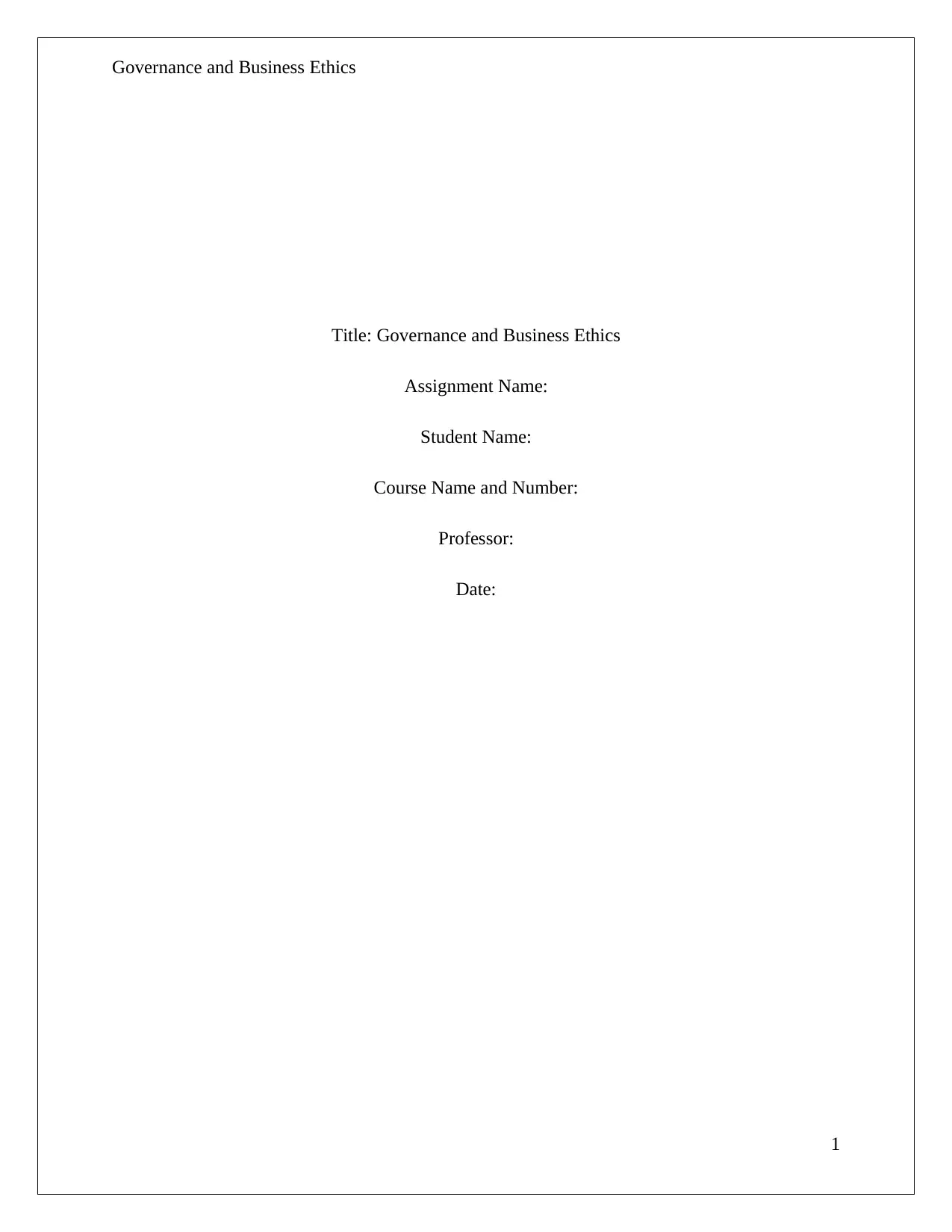
Governance and Business Ethics
Title: Governance and Business Ethics
Assignment Name:
Student Name:
Course Name and Number:
Professor:
Date:
1
Title: Governance and Business Ethics
Assignment Name:
Student Name:
Course Name and Number:
Professor:
Date:
1
Secure Best Marks with AI Grader
Need help grading? Try our AI Grader for instant feedback on your assignments.
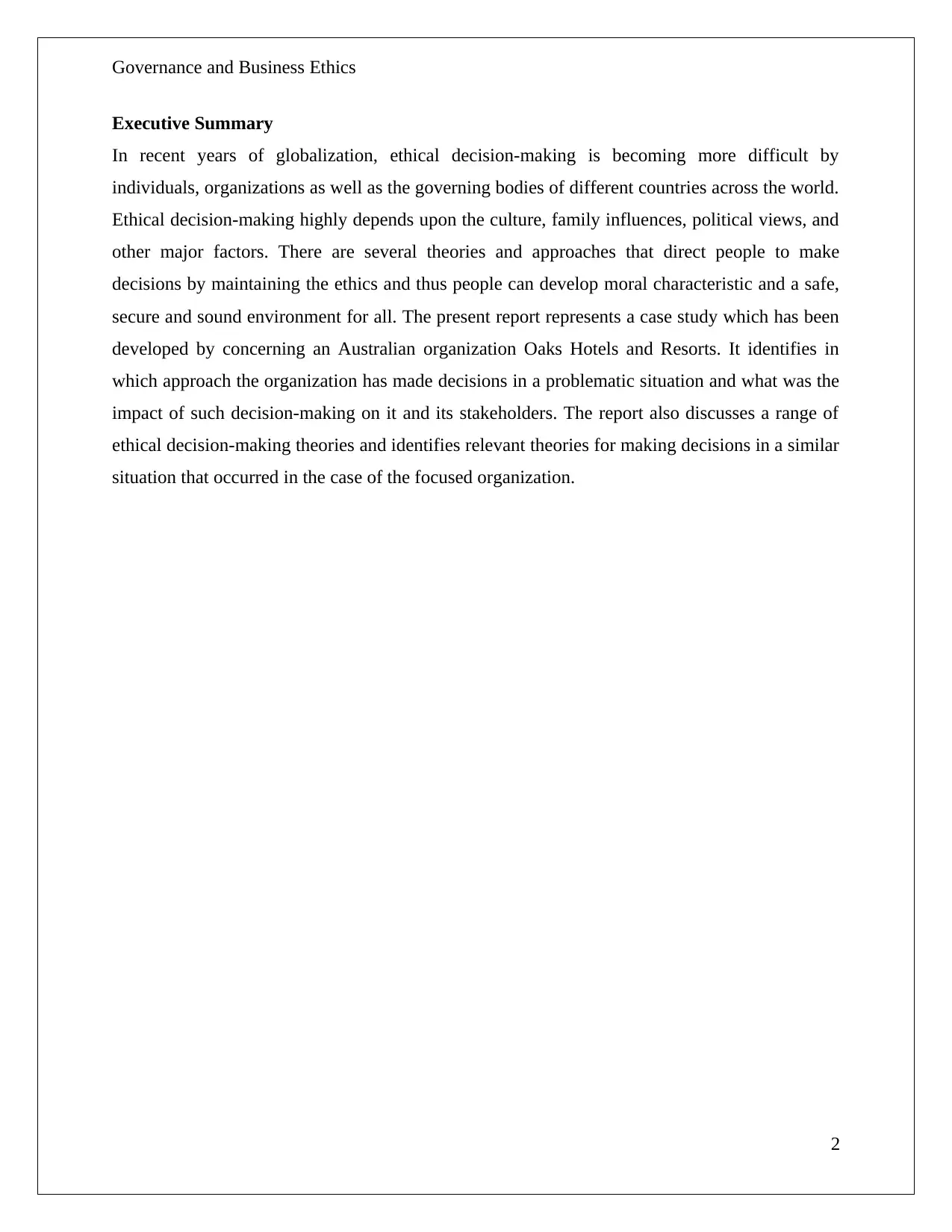
Governance and Business Ethics
Executive Summary
In recent years of globalization, ethical decision-making is becoming more difficult by
individuals, organizations as well as the governing bodies of different countries across the world.
Ethical decision-making highly depends upon the culture, family influences, political views, and
other major factors. There are several theories and approaches that direct people to make
decisions by maintaining the ethics and thus people can develop moral characteristic and a safe,
secure and sound environment for all. The present report represents a case study which has been
developed by concerning an Australian organization Oaks Hotels and Resorts. It identifies in
which approach the organization has made decisions in a problematic situation and what was the
impact of such decision-making on it and its stakeholders. The report also discusses a range of
ethical decision-making theories and identifies relevant theories for making decisions in a similar
situation that occurred in the case of the focused organization.
2
Executive Summary
In recent years of globalization, ethical decision-making is becoming more difficult by
individuals, organizations as well as the governing bodies of different countries across the world.
Ethical decision-making highly depends upon the culture, family influences, political views, and
other major factors. There are several theories and approaches that direct people to make
decisions by maintaining the ethics and thus people can develop moral characteristic and a safe,
secure and sound environment for all. The present report represents a case study which has been
developed by concerning an Australian organization Oaks Hotels and Resorts. It identifies in
which approach the organization has made decisions in a problematic situation and what was the
impact of such decision-making on it and its stakeholders. The report also discusses a range of
ethical decision-making theories and identifies relevant theories for making decisions in a similar
situation that occurred in the case of the focused organization.
2
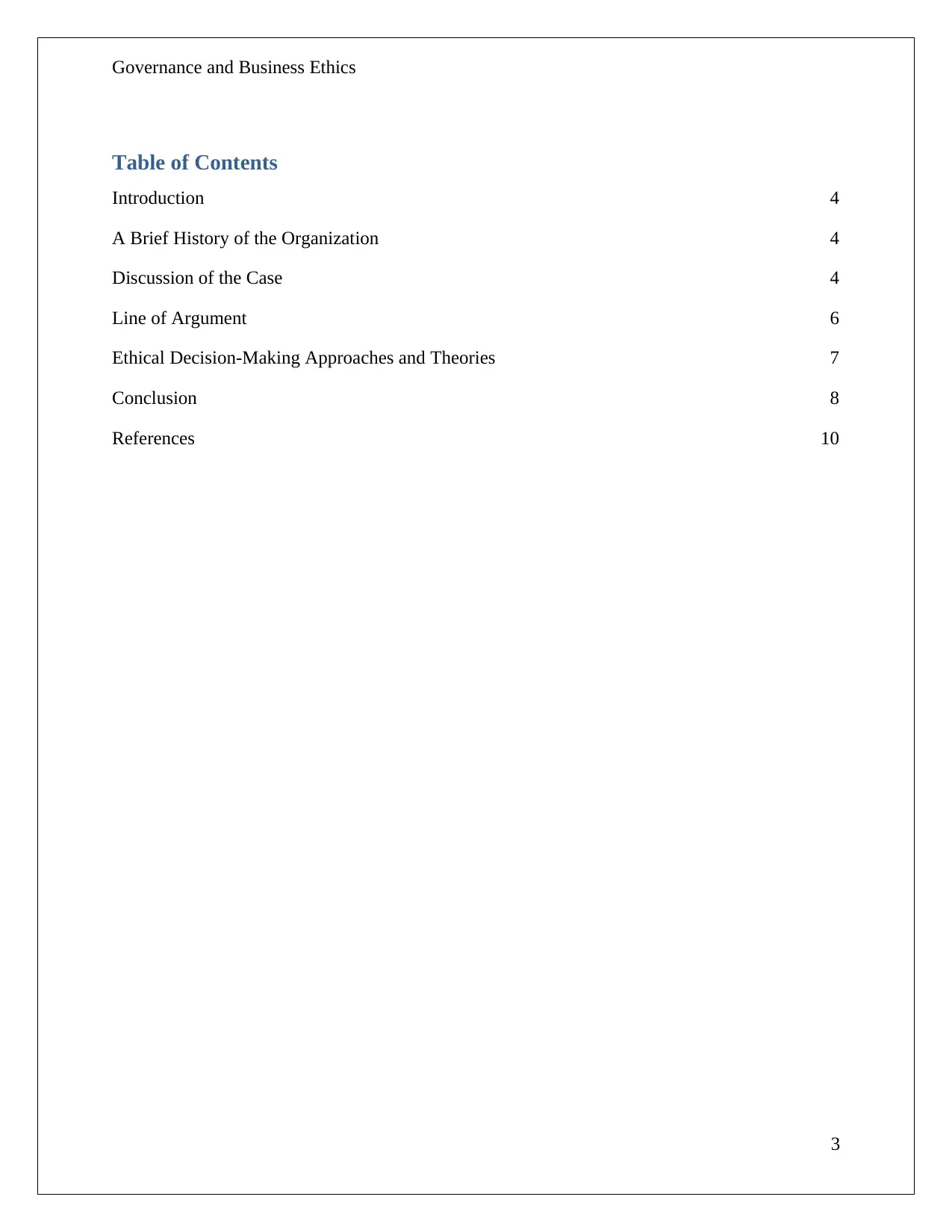
Governance and Business Ethics
Table of Contents
Introduction 4
A Brief History of the Organization 4
Discussion of the Case 4
Line of Argument 6
Ethical Decision-Making Approaches and Theories 7
Conclusion 8
References 10
3
Table of Contents
Introduction 4
A Brief History of the Organization 4
Discussion of the Case 4
Line of Argument 6
Ethical Decision-Making Approaches and Theories 7
Conclusion 8
References 10
3
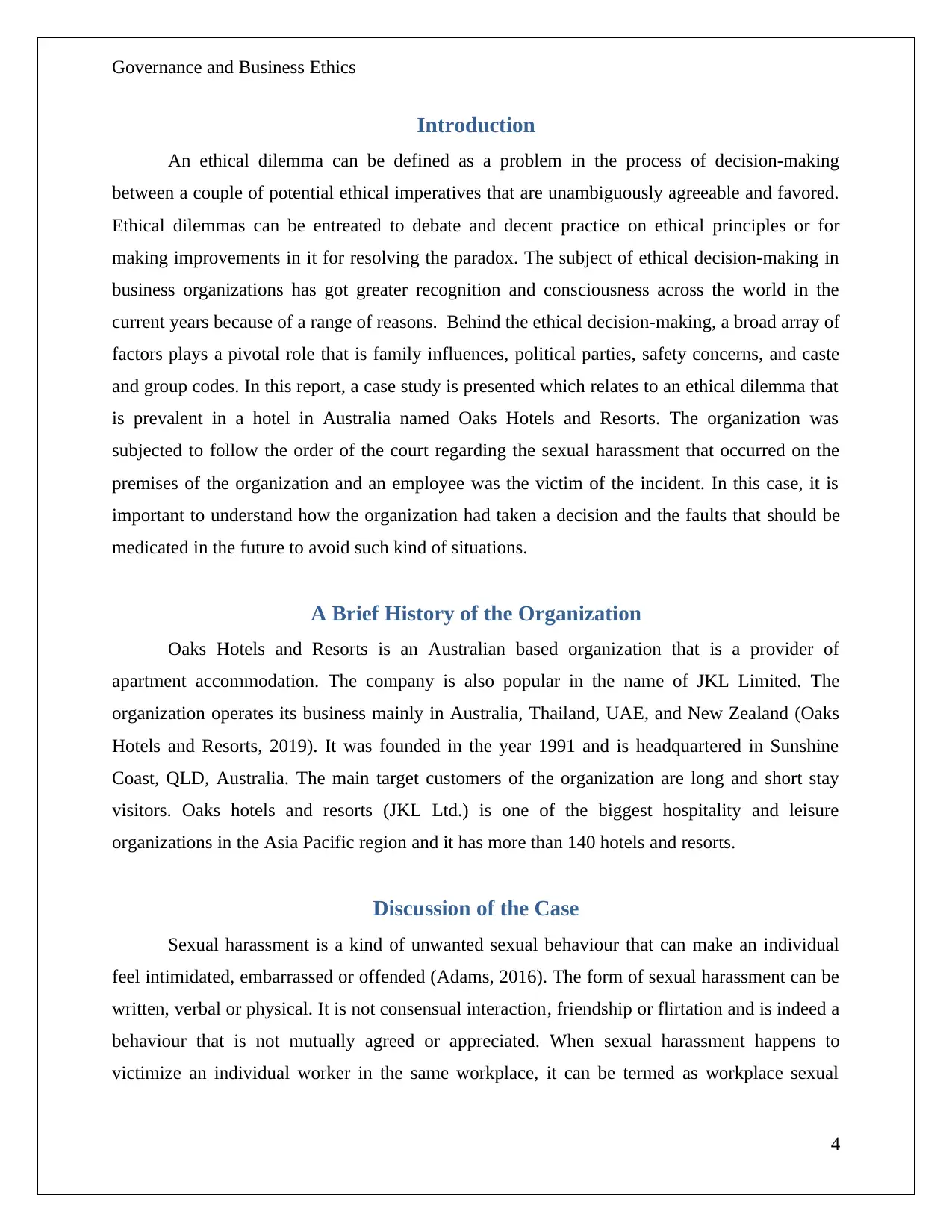
Governance and Business Ethics
Introduction
An ethical dilemma can be defined as a problem in the process of decision-making
between a couple of potential ethical imperatives that are unambiguously agreeable and favored.
Ethical dilemmas can be entreated to debate and decent practice on ethical principles or for
making improvements in it for resolving the paradox. The subject of ethical decision-making in
business organizations has got greater recognition and consciousness across the world in the
current years because of a range of reasons. Behind the ethical decision-making, a broad array of
factors plays a pivotal role that is family influences, political parties, safety concerns, and caste
and group codes. In this report, a case study is presented which relates to an ethical dilemma that
is prevalent in a hotel in Australia named Oaks Hotels and Resorts. The organization was
subjected to follow the order of the court regarding the sexual harassment that occurred on the
premises of the organization and an employee was the victim of the incident. In this case, it is
important to understand how the organization had taken a decision and the faults that should be
medicated in the future to avoid such kind of situations.
A Brief History of the Organization
Oaks Hotels and Resorts is an Australian based organization that is a provider of
apartment accommodation. The company is also popular in the name of JKL Limited. The
organization operates its business mainly in Australia, Thailand, UAE, and New Zealand (Oaks
Hotels and Resorts, 2019). It was founded in the year 1991 and is headquartered in Sunshine
Coast, QLD, Australia. The main target customers of the organization are long and short stay
visitors. Oaks hotels and resorts (JKL Ltd.) is one of the biggest hospitality and leisure
organizations in the Asia Pacific region and it has more than 140 hotels and resorts.
Discussion of the Case
Sexual harassment is a kind of unwanted sexual behaviour that can make an individual
feel intimidated, embarrassed or offended (Adams, 2016). The form of sexual harassment can be
written, verbal or physical. It is not consensual interaction, friendship or flirtation and is indeed a
behaviour that is not mutually agreed or appreciated. When sexual harassment happens to
victimize an individual worker in the same workplace, it can be termed as workplace sexual
4
Introduction
An ethical dilemma can be defined as a problem in the process of decision-making
between a couple of potential ethical imperatives that are unambiguously agreeable and favored.
Ethical dilemmas can be entreated to debate and decent practice on ethical principles or for
making improvements in it for resolving the paradox. The subject of ethical decision-making in
business organizations has got greater recognition and consciousness across the world in the
current years because of a range of reasons. Behind the ethical decision-making, a broad array of
factors plays a pivotal role that is family influences, political parties, safety concerns, and caste
and group codes. In this report, a case study is presented which relates to an ethical dilemma that
is prevalent in a hotel in Australia named Oaks Hotels and Resorts. The organization was
subjected to follow the order of the court regarding the sexual harassment that occurred on the
premises of the organization and an employee was the victim of the incident. In this case, it is
important to understand how the organization had taken a decision and the faults that should be
medicated in the future to avoid such kind of situations.
A Brief History of the Organization
Oaks Hotels and Resorts is an Australian based organization that is a provider of
apartment accommodation. The company is also popular in the name of JKL Limited. The
organization operates its business mainly in Australia, Thailand, UAE, and New Zealand (Oaks
Hotels and Resorts, 2019). It was founded in the year 1991 and is headquartered in Sunshine
Coast, QLD, Australia. The main target customers of the organization are long and short stay
visitors. Oaks hotels and resorts (JKL Ltd.) is one of the biggest hospitality and leisure
organizations in the Asia Pacific region and it has more than 140 hotels and resorts.
Discussion of the Case
Sexual harassment is a kind of unwanted sexual behaviour that can make an individual
feel intimidated, embarrassed or offended (Adams, 2016). The form of sexual harassment can be
written, verbal or physical. It is not consensual interaction, friendship or flirtation and is indeed a
behaviour that is not mutually agreed or appreciated. When sexual harassment happens to
victimize an individual worker in the same workplace, it can be termed as workplace sexual
4
Secure Best Marks with AI Grader
Need help grading? Try our AI Grader for instant feedback on your assignments.
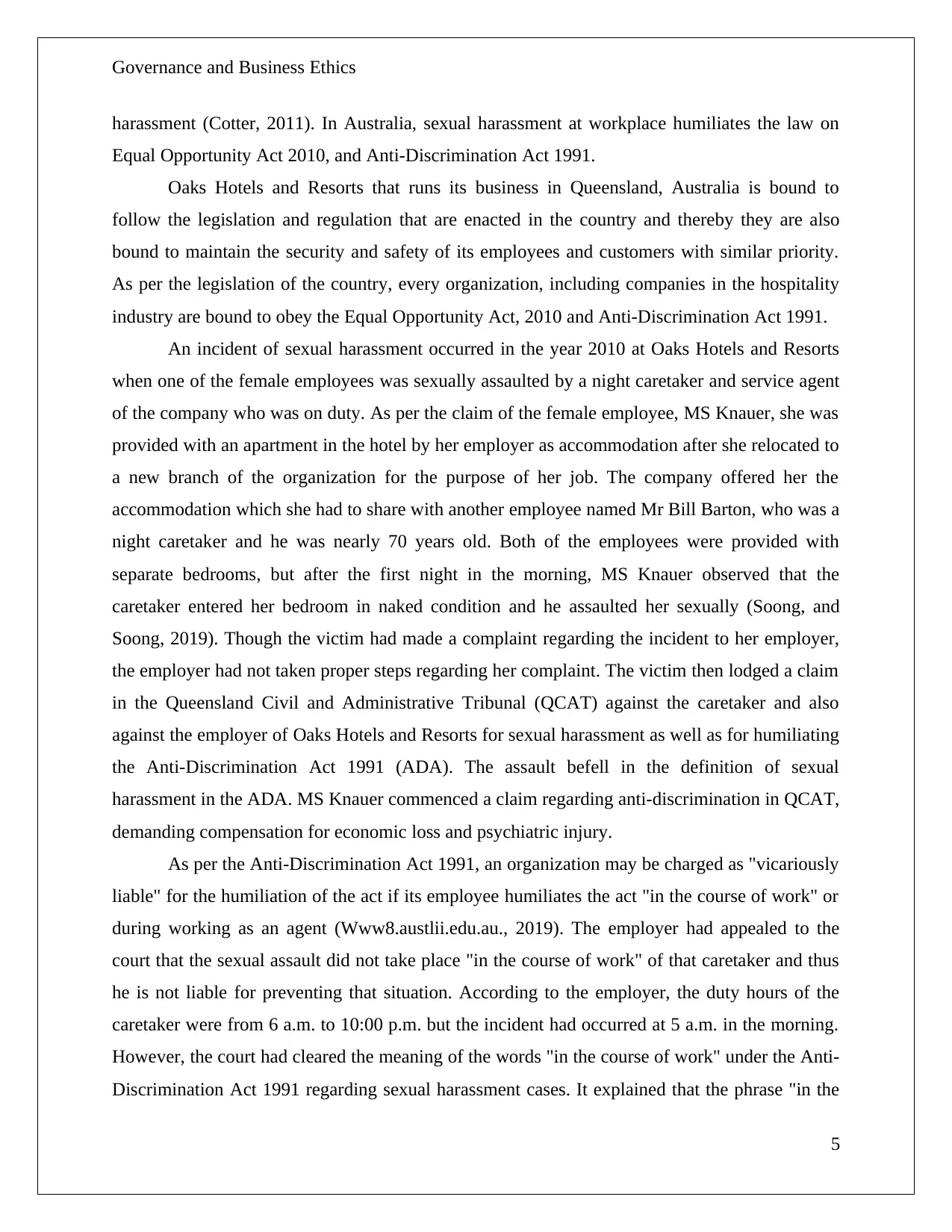
Governance and Business Ethics
harassment (Cotter, 2011). In Australia, sexual harassment at workplace humiliates the law on
Equal Opportunity Act 2010, and Anti-Discrimination Act 1991.
Oaks Hotels and Resorts that runs its business in Queensland, Australia is bound to
follow the legislation and regulation that are enacted in the country and thereby they are also
bound to maintain the security and safety of its employees and customers with similar priority.
As per the legislation of the country, every organization, including companies in the hospitality
industry are bound to obey the Equal Opportunity Act, 2010 and Anti-Discrimination Act 1991.
An incident of sexual harassment occurred in the year 2010 at Oaks Hotels and Resorts
when one of the female employees was sexually assaulted by a night caretaker and service agent
of the company who was on duty. As per the claim of the female employee, MS Knauer, she was
provided with an apartment in the hotel by her employer as accommodation after she relocated to
a new branch of the organization for the purpose of her job. The company offered her the
accommodation which she had to share with another employee named Mr Bill Barton, who was a
night caretaker and he was nearly 70 years old. Both of the employees were provided with
separate bedrooms, but after the first night in the morning, MS Knauer observed that the
caretaker entered her bedroom in naked condition and he assaulted her sexually (Soong, and
Soong, 2019). Though the victim had made a complaint regarding the incident to her employer,
the employer had not taken proper steps regarding her complaint. The victim then lodged a claim
in the Queensland Civil and Administrative Tribunal (QCAT) against the caretaker and also
against the employer of Oaks Hotels and Resorts for sexual harassment as well as for humiliating
the Anti-Discrimination Act 1991 (ADA). The assault befell in the definition of sexual
harassment in the ADA. MS Knauer commenced a claim regarding anti-discrimination in QCAT,
demanding compensation for economic loss and psychiatric injury.
As per the Anti-Discrimination Act 1991, an organization may be charged as "vicariously
liable" for the humiliation of the act if its employee humiliates the act "in the course of work" or
during working as an agent (Www8.austlii.edu.au., 2019). The employer had appealed to the
court that the sexual assault did not take place "in the course of work" of that caretaker and thus
he is not liable for preventing that situation. According to the employer, the duty hours of the
caretaker were from 6 a.m. to 10:00 p.m. but the incident had occurred at 5 a.m. in the morning.
However, the court had cleared the meaning of the words "in the course of work" under the Anti-
Discrimination Act 1991 regarding sexual harassment cases. It explained that the phrase "in the
5
harassment (Cotter, 2011). In Australia, sexual harassment at workplace humiliates the law on
Equal Opportunity Act 2010, and Anti-Discrimination Act 1991.
Oaks Hotels and Resorts that runs its business in Queensland, Australia is bound to
follow the legislation and regulation that are enacted in the country and thereby they are also
bound to maintain the security and safety of its employees and customers with similar priority.
As per the legislation of the country, every organization, including companies in the hospitality
industry are bound to obey the Equal Opportunity Act, 2010 and Anti-Discrimination Act 1991.
An incident of sexual harassment occurred in the year 2010 at Oaks Hotels and Resorts
when one of the female employees was sexually assaulted by a night caretaker and service agent
of the company who was on duty. As per the claim of the female employee, MS Knauer, she was
provided with an apartment in the hotel by her employer as accommodation after she relocated to
a new branch of the organization for the purpose of her job. The company offered her the
accommodation which she had to share with another employee named Mr Bill Barton, who was a
night caretaker and he was nearly 70 years old. Both of the employees were provided with
separate bedrooms, but after the first night in the morning, MS Knauer observed that the
caretaker entered her bedroom in naked condition and he assaulted her sexually (Soong, and
Soong, 2019). Though the victim had made a complaint regarding the incident to her employer,
the employer had not taken proper steps regarding her complaint. The victim then lodged a claim
in the Queensland Civil and Administrative Tribunal (QCAT) against the caretaker and also
against the employer of Oaks Hotels and Resorts for sexual harassment as well as for humiliating
the Anti-Discrimination Act 1991 (ADA). The assault befell in the definition of sexual
harassment in the ADA. MS Knauer commenced a claim regarding anti-discrimination in QCAT,
demanding compensation for economic loss and psychiatric injury.
As per the Anti-Discrimination Act 1991, an organization may be charged as "vicariously
liable" for the humiliation of the act if its employee humiliates the act "in the course of work" or
during working as an agent (Www8.austlii.edu.au., 2019). The employer had appealed to the
court that the sexual assault did not take place "in the course of work" of that caretaker and thus
he is not liable for preventing that situation. According to the employer, the duty hours of the
caretaker were from 6 a.m. to 10:00 p.m. but the incident had occurred at 5 a.m. in the morning.
However, the court had cleared the meaning of the words "in the course of work" under the Anti-
Discrimination Act 1991 regarding sexual harassment cases. It explained that the phrase "in the
5
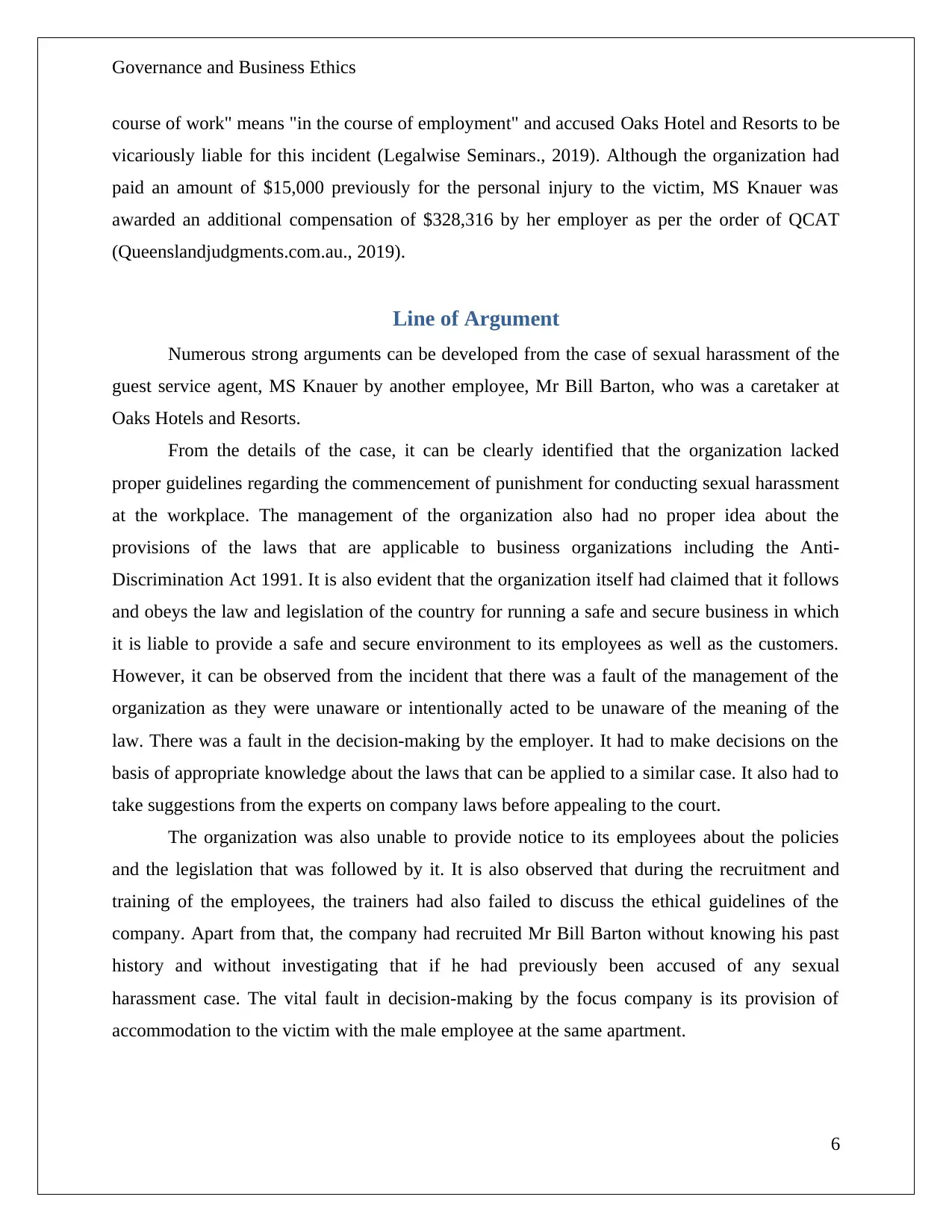
Governance and Business Ethics
course of work" means "in the course of employment" and accused Oaks Hotel and Resorts to be
vicariously liable for this incident (Legalwise Seminars., 2019). Although the organization had
paid an amount of $15,000 previously for the personal injury to the victim, MS Knauer was
awarded an additional compensation of $328,316 by her employer as per the order of QCAT
(Queenslandjudgments.com.au., 2019).
Line of Argument
Numerous strong arguments can be developed from the case of sexual harassment of the
guest service agent, MS Knauer by another employee, Mr Bill Barton, who was a caretaker at
Oaks Hotels and Resorts.
From the details of the case, it can be clearly identified that the organization lacked
proper guidelines regarding the commencement of punishment for conducting sexual harassment
at the workplace. The management of the organization also had no proper idea about the
provisions of the laws that are applicable to business organizations including the Anti-
Discrimination Act 1991. It is also evident that the organization itself had claimed that it follows
and obeys the law and legislation of the country for running a safe and secure business in which
it is liable to provide a safe and secure environment to its employees as well as the customers.
However, it can be observed from the incident that there was a fault of the management of the
organization as they were unaware or intentionally acted to be unaware of the meaning of the
law. There was a fault in the decision-making by the employer. It had to make decisions on the
basis of appropriate knowledge about the laws that can be applied to a similar case. It also had to
take suggestions from the experts on company laws before appealing to the court.
The organization was also unable to provide notice to its employees about the policies
and the legislation that was followed by it. It is also observed that during the recruitment and
training of the employees, the trainers had also failed to discuss the ethical guidelines of the
company. Apart from that, the company had recruited Mr Bill Barton without knowing his past
history and without investigating that if he had previously been accused of any sexual
harassment case. The vital fault in decision-making by the focus company is its provision of
accommodation to the victim with the male employee at the same apartment.
6
course of work" means "in the course of employment" and accused Oaks Hotel and Resorts to be
vicariously liable for this incident (Legalwise Seminars., 2019). Although the organization had
paid an amount of $15,000 previously for the personal injury to the victim, MS Knauer was
awarded an additional compensation of $328,316 by her employer as per the order of QCAT
(Queenslandjudgments.com.au., 2019).
Line of Argument
Numerous strong arguments can be developed from the case of sexual harassment of the
guest service agent, MS Knauer by another employee, Mr Bill Barton, who was a caretaker at
Oaks Hotels and Resorts.
From the details of the case, it can be clearly identified that the organization lacked
proper guidelines regarding the commencement of punishment for conducting sexual harassment
at the workplace. The management of the organization also had no proper idea about the
provisions of the laws that are applicable to business organizations including the Anti-
Discrimination Act 1991. It is also evident that the organization itself had claimed that it follows
and obeys the law and legislation of the country for running a safe and secure business in which
it is liable to provide a safe and secure environment to its employees as well as the customers.
However, it can be observed from the incident that there was a fault of the management of the
organization as they were unaware or intentionally acted to be unaware of the meaning of the
law. There was a fault in the decision-making by the employer. It had to make decisions on the
basis of appropriate knowledge about the laws that can be applied to a similar case. It also had to
take suggestions from the experts on company laws before appealing to the court.
The organization was also unable to provide notice to its employees about the policies
and the legislation that was followed by it. It is also observed that during the recruitment and
training of the employees, the trainers had also failed to discuss the ethical guidelines of the
company. Apart from that, the company had recruited Mr Bill Barton without knowing his past
history and without investigating that if he had previously been accused of any sexual
harassment case. The vital fault in decision-making by the focus company is its provision of
accommodation to the victim with the male employee at the same apartment.
6
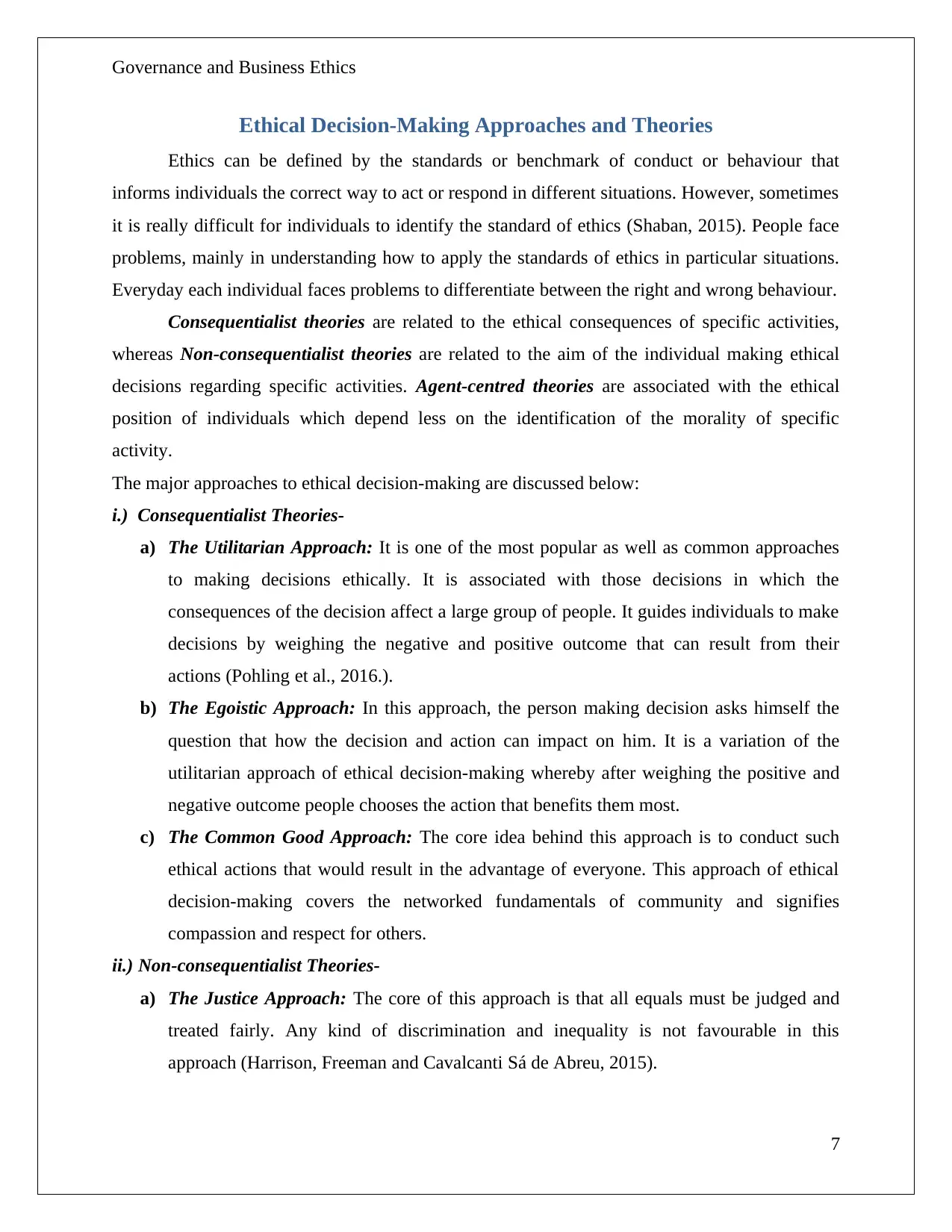
Governance and Business Ethics
Ethical Decision-Making Approaches and Theories
Ethics can be defined by the standards or benchmark of conduct or behaviour that
informs individuals the correct way to act or respond in different situations. However, sometimes
it is really difficult for individuals to identify the standard of ethics (Shaban, 2015). People face
problems, mainly in understanding how to apply the standards of ethics in particular situations.
Everyday each individual faces problems to differentiate between the right and wrong behaviour.
Consequentialist theories are related to the ethical consequences of specific activities,
whereas Non-consequentialist theories are related to the aim of the individual making ethical
decisions regarding specific activities. Agent-centred theories are associated with the ethical
position of individuals which depend less on the identification of the morality of specific
activity.
The major approaches to ethical decision-making are discussed below:
i.) Consequentialist Theories-
a) The Utilitarian Approach: It is one of the most popular as well as common approaches
to making decisions ethically. It is associated with those decisions in which the
consequences of the decision affect a large group of people. It guides individuals to make
decisions by weighing the negative and positive outcome that can result from their
actions (Pohling et al., 2016.).
b) The Egoistic Approach: In this approach, the person making decision asks himself the
question that how the decision and action can impact on him. It is a variation of the
utilitarian approach of ethical decision-making whereby after weighing the positive and
negative outcome people chooses the action that benefits them most.
c) The Common Good Approach: The core idea behind this approach is to conduct such
ethical actions that would result in the advantage of everyone. This approach of ethical
decision-making covers the networked fundamentals of community and signifies
compassion and respect for others.
ii.) Non-consequentialist Theories-
a) The Justice Approach: The core of this approach is that all equals must be judged and
treated fairly. Any kind of discrimination and inequality is not favourable in this
approach (Harrison, Freeman and Cavalcanti Sá de Abreu, 2015).
7
Ethical Decision-Making Approaches and Theories
Ethics can be defined by the standards or benchmark of conduct or behaviour that
informs individuals the correct way to act or respond in different situations. However, sometimes
it is really difficult for individuals to identify the standard of ethics (Shaban, 2015). People face
problems, mainly in understanding how to apply the standards of ethics in particular situations.
Everyday each individual faces problems to differentiate between the right and wrong behaviour.
Consequentialist theories are related to the ethical consequences of specific activities,
whereas Non-consequentialist theories are related to the aim of the individual making ethical
decisions regarding specific activities. Agent-centred theories are associated with the ethical
position of individuals which depend less on the identification of the morality of specific
activity.
The major approaches to ethical decision-making are discussed below:
i.) Consequentialist Theories-
a) The Utilitarian Approach: It is one of the most popular as well as common approaches
to making decisions ethically. It is associated with those decisions in which the
consequences of the decision affect a large group of people. It guides individuals to make
decisions by weighing the negative and positive outcome that can result from their
actions (Pohling et al., 2016.).
b) The Egoistic Approach: In this approach, the person making decision asks himself the
question that how the decision and action can impact on him. It is a variation of the
utilitarian approach of ethical decision-making whereby after weighing the positive and
negative outcome people chooses the action that benefits them most.
c) The Common Good Approach: The core idea behind this approach is to conduct such
ethical actions that would result in the advantage of everyone. This approach of ethical
decision-making covers the networked fundamentals of community and signifies
compassion and respect for others.
ii.) Non-consequentialist Theories-
a) The Justice Approach: The core of this approach is that all equals must be judged and
treated fairly. Any kind of discrimination and inequality is not favourable in this
approach (Harrison, Freeman and Cavalcanti Sá de Abreu, 2015).
7
Paraphrase This Document
Need a fresh take? Get an instant paraphrase of this document with our AI Paraphraser
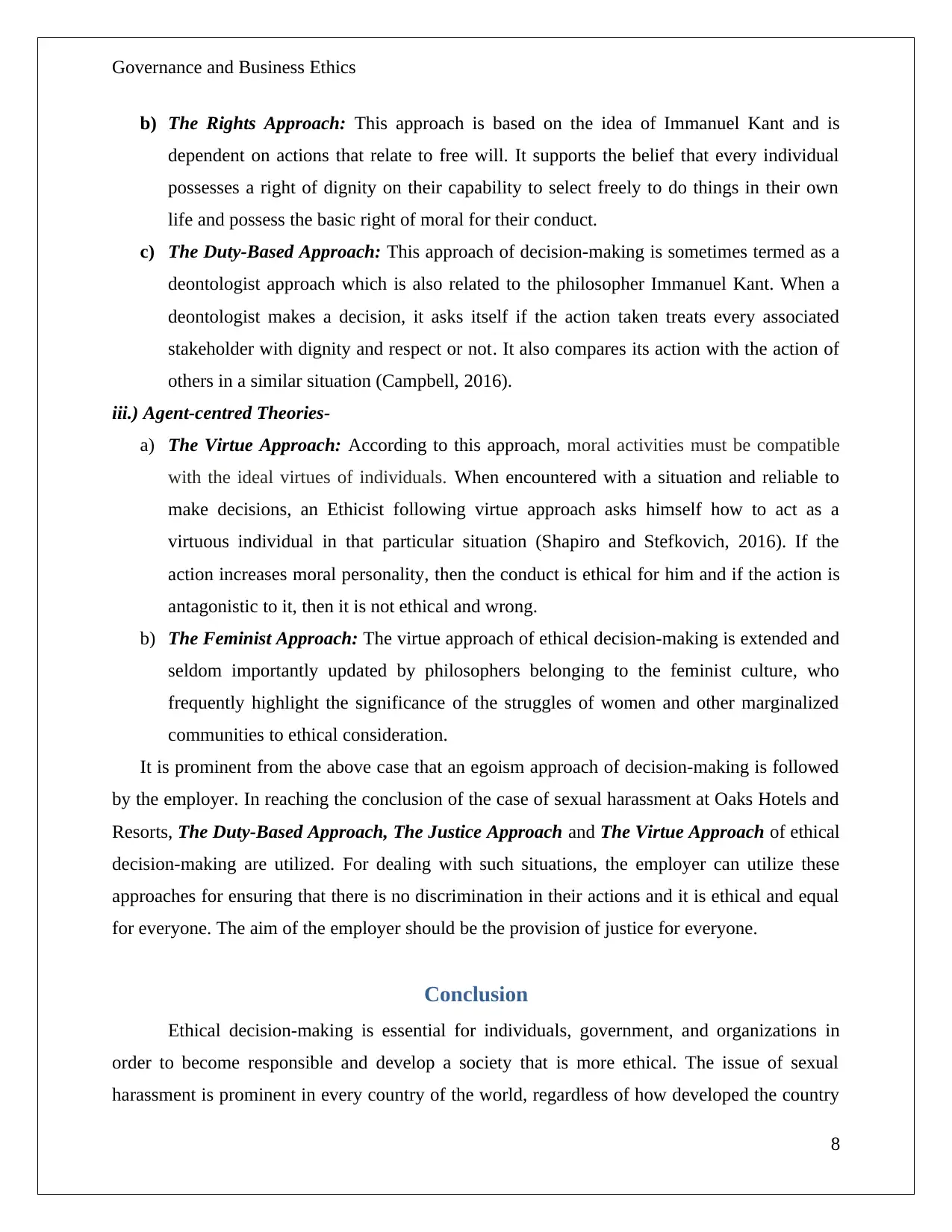
Governance and Business Ethics
b) The Rights Approach: This approach is based on the idea of Immanuel Kant and is
dependent on actions that relate to free will. It supports the belief that every individual
possesses a right of dignity on their capability to select freely to do things in their own
life and possess the basic right of moral for their conduct.
c) The Duty-Based Approach: This approach of decision-making is sometimes termed as a
deontologist approach which is also related to the philosopher Immanuel Kant. When a
deontologist makes a decision, it asks itself if the action taken treats every associated
stakeholder with dignity and respect or not. It also compares its action with the action of
others in a similar situation (Campbell, 2016).
iii.) Agent-centred Theories-
a) The Virtue Approach: According to this approach, moral activities must be compatible
with the ideal virtues of individuals. When encountered with a situation and reliable to
make decisions, an Ethicist following virtue approach asks himself how to act as a
virtuous individual in that particular situation (Shapiro and Stefkovich, 2016). If the
action increases moral personality, then the conduct is ethical for him and if the action is
antagonistic to it, then it is not ethical and wrong.
b) The Feminist Approach: The virtue approach of ethical decision-making is extended and
seldom importantly updated by philosophers belonging to the feminist culture, who
frequently highlight the significance of the struggles of women and other marginalized
communities to ethical consideration.
It is prominent from the above case that an egoism approach of decision-making is followed
by the employer. In reaching the conclusion of the case of sexual harassment at Oaks Hotels and
Resorts, The Duty-Based Approach, The Justice Approach and The Virtue Approach of ethical
decision-making are utilized. For dealing with such situations, the employer can utilize these
approaches for ensuring that there is no discrimination in their actions and it is ethical and equal
for everyone. The aim of the employer should be the provision of justice for everyone.
Conclusion
Ethical decision-making is essential for individuals, government, and organizations in
order to become responsible and develop a society that is more ethical. The issue of sexual
harassment is prominent in every country of the world, regardless of how developed the country
8
b) The Rights Approach: This approach is based on the idea of Immanuel Kant and is
dependent on actions that relate to free will. It supports the belief that every individual
possesses a right of dignity on their capability to select freely to do things in their own
life and possess the basic right of moral for their conduct.
c) The Duty-Based Approach: This approach of decision-making is sometimes termed as a
deontologist approach which is also related to the philosopher Immanuel Kant. When a
deontologist makes a decision, it asks itself if the action taken treats every associated
stakeholder with dignity and respect or not. It also compares its action with the action of
others in a similar situation (Campbell, 2016).
iii.) Agent-centred Theories-
a) The Virtue Approach: According to this approach, moral activities must be compatible
with the ideal virtues of individuals. When encountered with a situation and reliable to
make decisions, an Ethicist following virtue approach asks himself how to act as a
virtuous individual in that particular situation (Shapiro and Stefkovich, 2016). If the
action increases moral personality, then the conduct is ethical for him and if the action is
antagonistic to it, then it is not ethical and wrong.
b) The Feminist Approach: The virtue approach of ethical decision-making is extended and
seldom importantly updated by philosophers belonging to the feminist culture, who
frequently highlight the significance of the struggles of women and other marginalized
communities to ethical consideration.
It is prominent from the above case that an egoism approach of decision-making is followed
by the employer. In reaching the conclusion of the case of sexual harassment at Oaks Hotels and
Resorts, The Duty-Based Approach, The Justice Approach and The Virtue Approach of ethical
decision-making are utilized. For dealing with such situations, the employer can utilize these
approaches for ensuring that there is no discrimination in their actions and it is ethical and equal
for everyone. The aim of the employer should be the provision of justice for everyone.
Conclusion
Ethical decision-making is essential for individuals, government, and organizations in
order to become responsible and develop a society that is more ethical. The issue of sexual
harassment is prominent in every country of the world, regardless of how developed the country
8
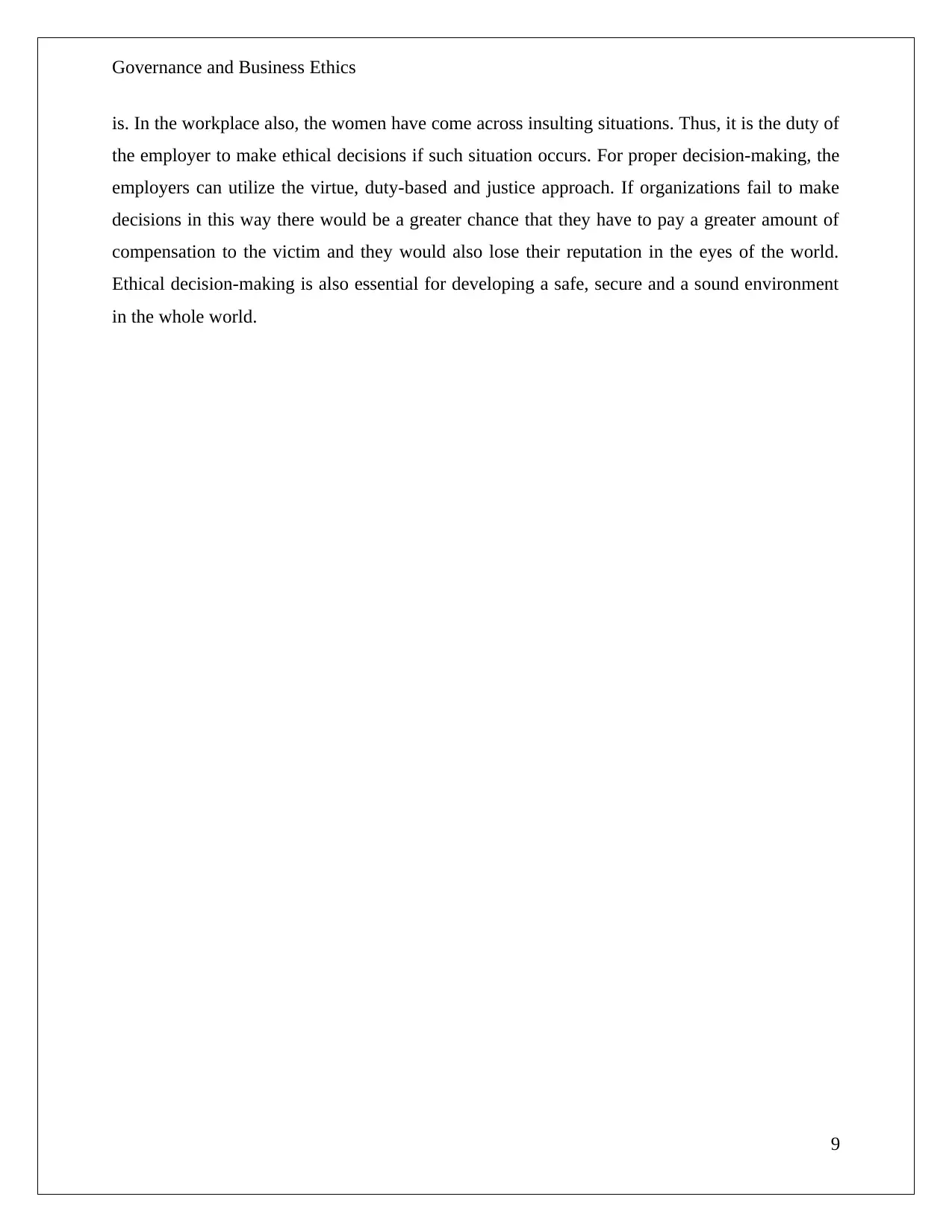
Governance and Business Ethics
is. In the workplace also, the women have come across insulting situations. Thus, it is the duty of
the employer to make ethical decisions if such situation occurs. For proper decision-making, the
employers can utilize the virtue, duty-based and justice approach. If organizations fail to make
decisions in this way there would be a greater chance that they have to pay a greater amount of
compensation to the victim and they would also lose their reputation in the eyes of the world.
Ethical decision-making is also essential for developing a safe, secure and a sound environment
in the whole world.
9
is. In the workplace also, the women have come across insulting situations. Thus, it is the duty of
the employer to make ethical decisions if such situation occurs. For proper decision-making, the
employers can utilize the virtue, duty-based and justice approach. If organizations fail to make
decisions in this way there would be a greater chance that they have to pay a greater amount of
compensation to the victim and they would also lose their reputation in the eyes of the world.
Ethical decision-making is also essential for developing a safe, secure and a sound environment
in the whole world.
9
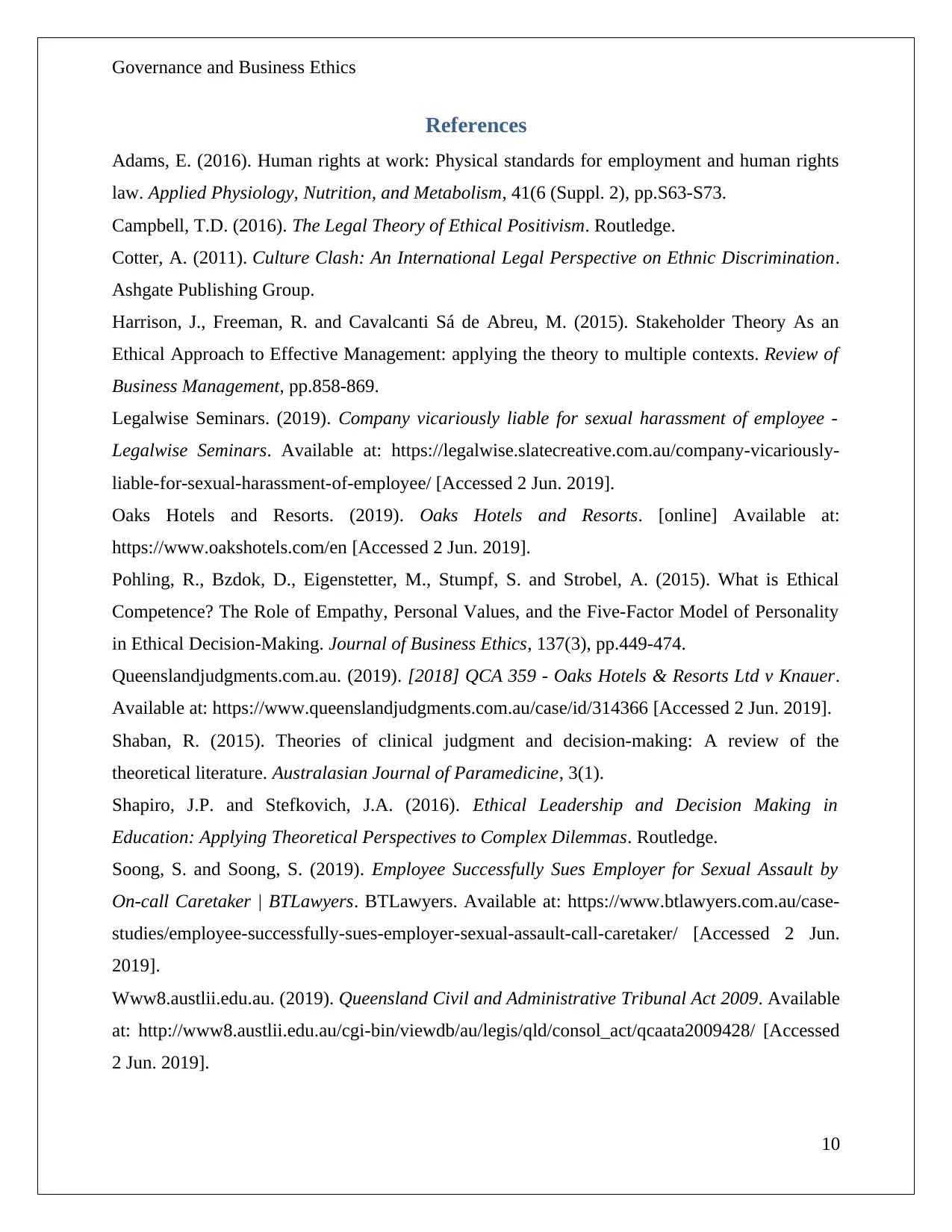
Governance and Business Ethics
References
Adams, E. (2016). Human rights at work: Physical standards for employment and human rights
law. Applied Physiology, Nutrition, and Metabolism, 41(6 (Suppl. 2), pp.S63-S73.
Campbell, T.D. (2016). The Legal Theory of Ethical Positivism. Routledge.
Cotter, A. (2011). Culture Clash: An International Legal Perspective on Ethnic Discrimination.
Ashgate Publishing Group.
Harrison, J., Freeman, R. and Cavalcanti Sá de Abreu, M. (2015). Stakeholder Theory As an
Ethical Approach to Effective Management: applying the theory to multiple contexts. Review of
Business Management, pp.858-869.
Legalwise Seminars. (2019). Company vicariously liable for sexual harassment of employee -
Legalwise Seminars. Available at: https://legalwise.slatecreative.com.au/company-vicariously-
liable-for-sexual-harassment-of-employee/ [Accessed 2 Jun. 2019].
Oaks Hotels and Resorts. (2019). Oaks Hotels and Resorts. [online] Available at:
https://www.oakshotels.com/en [Accessed 2 Jun. 2019].
Pohling, R., Bzdok, D., Eigenstetter, M., Stumpf, S. and Strobel, A. (2015). What is Ethical
Competence? The Role of Empathy, Personal Values, and the Five-Factor Model of Personality
in Ethical Decision-Making. Journal of Business Ethics, 137(3), pp.449-474.
Queenslandjudgments.com.au. (2019). [2018] QCA 359 - Oaks Hotels & Resorts Ltd v Knauer.
Available at: https://www.queenslandjudgments.com.au/case/id/314366 [Accessed 2 Jun. 2019].
Shaban, R. (2015). Theories of clinical judgment and decision-making: A review of the
theoretical literature. Australasian Journal of Paramedicine, 3(1).
Shapiro, J.P. and Stefkovich, J.A. (2016). Ethical Leadership and Decision Making in
Education: Applying Theoretical Perspectives to Complex Dilemmas. Routledge.
Soong, S. and Soong, S. (2019). Employee Successfully Sues Employer for Sexual Assault by
On-call Caretaker | BTLawyers. BTLawyers. Available at: https://www.btlawyers.com.au/case-
studies/employee-successfully-sues-employer-sexual-assault-call-caretaker/ [Accessed 2 Jun.
2019].
Www8.austlii.edu.au. (2019). Queensland Civil and Administrative Tribunal Act 2009. Available
at: http://www8.austlii.edu.au/cgi-bin/viewdb/au/legis/qld/consol_act/qcaata2009428/ [Accessed
2 Jun. 2019].
10
References
Adams, E. (2016). Human rights at work: Physical standards for employment and human rights
law. Applied Physiology, Nutrition, and Metabolism, 41(6 (Suppl. 2), pp.S63-S73.
Campbell, T.D. (2016). The Legal Theory of Ethical Positivism. Routledge.
Cotter, A. (2011). Culture Clash: An International Legal Perspective on Ethnic Discrimination.
Ashgate Publishing Group.
Harrison, J., Freeman, R. and Cavalcanti Sá de Abreu, M. (2015). Stakeholder Theory As an
Ethical Approach to Effective Management: applying the theory to multiple contexts. Review of
Business Management, pp.858-869.
Legalwise Seminars. (2019). Company vicariously liable for sexual harassment of employee -
Legalwise Seminars. Available at: https://legalwise.slatecreative.com.au/company-vicariously-
liable-for-sexual-harassment-of-employee/ [Accessed 2 Jun. 2019].
Oaks Hotels and Resorts. (2019). Oaks Hotels and Resorts. [online] Available at:
https://www.oakshotels.com/en [Accessed 2 Jun. 2019].
Pohling, R., Bzdok, D., Eigenstetter, M., Stumpf, S. and Strobel, A. (2015). What is Ethical
Competence? The Role of Empathy, Personal Values, and the Five-Factor Model of Personality
in Ethical Decision-Making. Journal of Business Ethics, 137(3), pp.449-474.
Queenslandjudgments.com.au. (2019). [2018] QCA 359 - Oaks Hotels & Resorts Ltd v Knauer.
Available at: https://www.queenslandjudgments.com.au/case/id/314366 [Accessed 2 Jun. 2019].
Shaban, R. (2015). Theories of clinical judgment and decision-making: A review of the
theoretical literature. Australasian Journal of Paramedicine, 3(1).
Shapiro, J.P. and Stefkovich, J.A. (2016). Ethical Leadership and Decision Making in
Education: Applying Theoretical Perspectives to Complex Dilemmas. Routledge.
Soong, S. and Soong, S. (2019). Employee Successfully Sues Employer for Sexual Assault by
On-call Caretaker | BTLawyers. BTLawyers. Available at: https://www.btlawyers.com.au/case-
studies/employee-successfully-sues-employer-sexual-assault-call-caretaker/ [Accessed 2 Jun.
2019].
Www8.austlii.edu.au. (2019). Queensland Civil and Administrative Tribunal Act 2009. Available
at: http://www8.austlii.edu.au/cgi-bin/viewdb/au/legis/qld/consol_act/qcaata2009428/ [Accessed
2 Jun. 2019].
10
1 out of 10
Related Documents
Your All-in-One AI-Powered Toolkit for Academic Success.
+13062052269
info@desklib.com
Available 24*7 on WhatsApp / Email
![[object Object]](/_next/static/media/star-bottom.7253800d.svg)
Unlock your academic potential
© 2024 | Zucol Services PVT LTD | All rights reserved.





